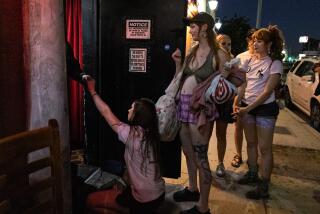Rotary Club Men-Only Rule Dealt Legal Blow
- Share via
In a stinging rebuke for discriminating against women, Rotary International was ordered by a state appellate court on Monday to reinstate the Duarte chapter it ousted eight years ago for admitting three women members.
A 49-page decision written by 2nd District Court of Appeal Justice Eugene McClosky reversed a 1983 ruling by Los Angeles Superior Court Judge Max F. Deutz that had upheld Duarte’s ouster and sanctioned the male-only membership of the international organization.
Justice Arleigh Woods and Los Angeles Superior Court Judge Irving Shimer, sitting as an appellate judge by special appointment, concurred in McClosky’s opinion.
“Incredibly, 14 years before the start of the 21st Century and 210 years after the signing of the Declaration of Independence,” McClosky wrote, “we still find ourselves having to write an opinion defending the right of American women to equal opportunity in a secular organization of approximately 20,000 clubs, with more than 900,000 members.”
Chapter Thrives
Duarte’s chapter, which has thrived as the Ex-Rotary Club, will not return to the international fold immediately, however.
An attorney for Rotary International, William John Kennedy, said he plans to appeal the ruling to the California Supreme Court and, if necessary, to the U.S. Supreme Court. No reinstatement is required until all appeals are exhausted.
Carol Agate, who represented the Duarte chapter and its women members on behalf of the American Civil Liberties Union, predicted that the state Supreme Court would let Monday’s ruling stand without granting any further hearing. The high court, she said, already decided that such organizations fall under the state’s Unruh Civil Rights Act, when it ordered the Boy Scouts of America to permit Timothy Curran to serve as a senior Scout, even though he was homosexual.
Both Kennedy and Agate agreed that the Court of Appeal decision, which they had not yet read, has statewide, if not wider, impact.
Kennedy expressed strong concern that the opinion, if not overturned, could force all organizations to open membership to any interested person or face lawsuits.
Both Deutz and the appellate justices decided the case solely on the state’s Unruh law, differing over whether Rotary qualified as a “business establishment” or an organization providing “goods, services and facilities” to members. The Unruh Act bans all discrimination against sex, race, religion or ethnic origin in such establishments.
Deutz said the group was a service club entitled to restrict its membership; the appellate justices ruled it a business that must be open to everyone.
‘Four-Way Test’
By excluding women, McClosky said, Rotary even violated its own “four-way test” urging members to ask four questions of any thought, utterance or action: “Is it the truth? Is it fair to all concerned? Will it build good will and better friendships? Will it be beneficial to all concerned?”
“While the Rotary organizations are in large part very well motivated and accomplish much good,” the opinion stated, “International’s discriminatory policy toward women clearly violates this test and evidences International’s failure to practice toward women the fairness ‘to all’ that it preaches.”
Even a cursory overview of the Evanston, Ill.-based Rotary International, McClosky wrote, “clearly establishes that International is an organization which exhibits substantial business-like attributes . . . and (is) clearly reflective of a business-like hierarchy.”
By overturning Deutz’s ruling on the basis of the Unruh Act, the appellate justices said it was unnecessary to decide the case on the Duarte club’s additional argument that the men-only rule violated women’s state constitutional right to pursue a business or profession.
Good for Business
However, they obviously disagreed strongly with Deutz’s opinion that excluding women did not interfere with that constitutional right, noting that most employers paid Rotary members’ dues because they considered membership good for business.
“This evidence leaves no doubt that business concerns are a motivating factor in joining local clubs,” McClosky wrote. “While Rotarians perform numerous and commendable charitable services at the local, national and international levels, the evidence establishes that there are business benefits enjoyed and capitalized upon by Rotarians and their businesses or employers. . . . (Rotary) has in effect provided a forum which encourages business relations to grow and which enhances the commercial advantages of its members.”
Evidence also clearly showed, the justices held, that Rotary provides goods or services--Rotary publications, emblems and the right to attend conferences to learn “management techniques that help improve . . . business or professional skills.”
In defending its male-only restriction, Rotary International had relied heavily on U.S. Supreme Court rulings that private clubs could limit membership according to whatever criteria they chose. Kennedy had argued that the principle was upheld in a 1984 high-court opinion approving a Minnesota state law that ended the Jaycees’ ban on women members.
Commercial Nature
The high court had said Jaycees, with its commercial nature, large size and lack of selectivity, failed to qualify for the First Amendment freedom of association protection allowing private clubs to choose members. The court also said, however, that other organizations--such as the Kiwanis--still could be considered “private” and legally could restrict members.
Kennedy claimed Rotary was more akin to Kiwanis than the Jaycees and therefore retained the right to ban women.
The appellate justices, however, read the Jaycees decision differently. Citing Rotary’s “immense size,” business benefits and worldwide congeniality to all members, the justices said: “From these features, we conclude that (Rotary) International and Rotary District 530 lack the distinctive characteristics that might afford them the constitutional protection to compel local Rotary clubs to exclude women.”
Agate said that although the Ex-Rotary Club of Duarte has flourished, individual members have suffered from the ouster because they have been unable to affiliate with other chapters when they moved away from Duarte.
One Woman Left
Of the three women who touched off the legal dispute when they joined the chapter, only Mary Lou Elliott remains an active member. Donna Bogart and Rosemary Frietag have moved to other communities.
Last month, Rotary International for the fifth time rejected proposed membership for women at its annual meeting in Chicago.
The organization, which has chapters in 54 countries, was founded 81 years ago by four Chicago men and took its name from their practice of rotating meeting sites to each member’s place of business.
More to Read
Sign up for Essential California
The most important California stories and recommendations in your inbox every morning.
You may occasionally receive promotional content from the Los Angeles Times.













